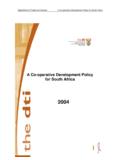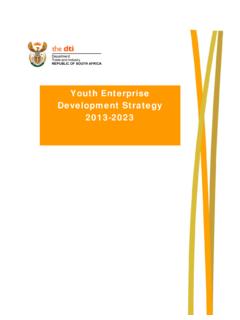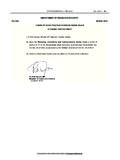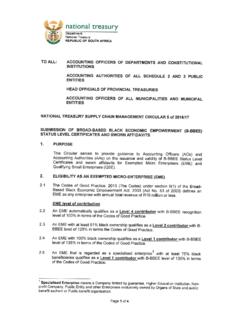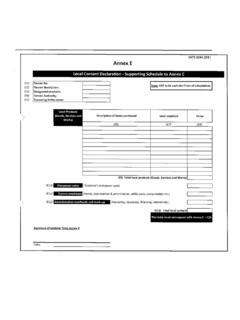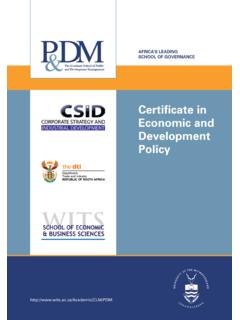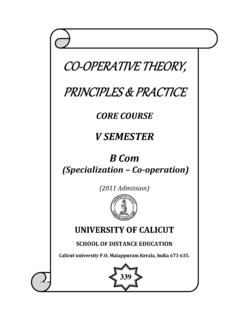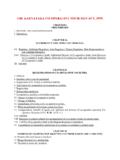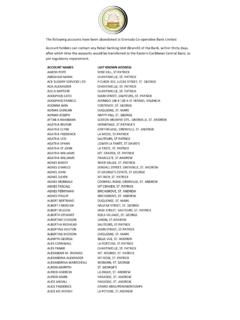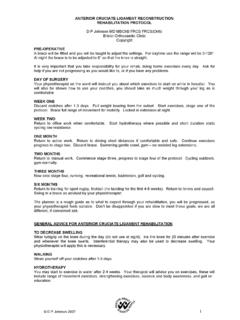Transcription of CHAPTER TWO: SITUATIONAL ANALYSIS OF …
1 Promoting an Integrated Co- operative Sector in South Africa 2012 2022 the dti Integrated Strategy on the Development and Promotion of Co-operatives 2 Department of Trade and Industry (the dti), 2012. Published by the dti, 2012. Reproduction is permitted, provided the source is acknowledged. This document contains confidential and proprietary information. The dissemination, copying, disclosure, use or taking of any action in reliance on the contents thereof, without the written consent of the dti, is strictly prohibited. ISBN: 978-0-9869824-3-9 Images are Media Club South Africa ( ) and South African Tourism ( ). Physical Address the dti Campus 77 Meintjies Street Sunnyside Pretoria 0002 Postal Address the dti Private Bag X84 Pretoria 0001 the dti Customer Contact Centre: 0861 843 384 3 CONTENTS Abbreviations and Acronyms .. 4 Executive Summary .. 7 Regulatory Vision .. 11 Mission.
2 12 12 Rationale for the Development of Co-operatives .. 13 Measurable Indicators and Targets .. 15 SECTION 1: INTERNATIONAL BEST PRACTICE AND EXPERIENCE .. 17 Co-operatives as a Global Driver of Economic Growth and Social Development .. 18 International Best Practice .. 20 Canada .. 20 Spain .. 21 Italy .. 22 India .. 25 Kenya .. 26 27 SECTION 2: SITUATIONAL ANALYSIS OF CO-OPERATIVES IN SOUTH AFRICA .. 30 The Co- operative Sector: 1922 1994 (Historical Situation) .. 31 The Co- operative Sector: 1995 2004 (Historical Situation) .. 33 The Co- operative Sector: 2005 2009 (Current Situation) .. 34 Registration Trends .. 34 Provincial Spread .. 35 Sector Spread .. 36 Survival and Mortality Rates of Co-operatives .. 38 Survival and Mortality Rates of Co-operatives per Province .. 38 Survival and Mortality Rates of Co-operatives per Sector .. 40 Legislative Compliance and Value of Co-operatives in the Economy.
3 41 The Co-operatives Movement .. 42 Government Capacity .. 44 Other Supportive 46 Challenges Associated with Co-operatives Development in South Africa .. 52 Government Challenges .. 52 Co- operative Management Challenges .. 54 Market Challenges .. 56 Challenges in the Co- operative Organisational Structures .. 56 SECTION 3: STRATEGIC PRINCIPLES, SUPPORT PROGRAMMES AND INSTITUTIONAL ARRANGEMENTS FOR IMPLEMENTATION .. 58 Key Guiding Principles .. 59 Promotion of Co-operatives Development as a Shared Responsibility .. 59 The Strategy Must Cover the Entire Co- operative Life Cycle .. 63 The Strategy Attends to All the Co- operative Beneficiary Base .. 63 Key Support Programmes and Institutional Arrangements for Implementation .. 67 Strategic Pillar 1: To Increase the Supply of non-Financial Support to Co-operatives .. 69 Strategic Pillar 2: To Create Demand for Co- operative Products and Service.
4 72 Strategic Pillar 3: To Improve the Sustainability of Co-operatives .. 74 Strategic Pillar 4: To Increase the Supply of Financial Support Services to Co-operatives .. 76 Institutional Arrangements for the Implementation of the Strategy .. 79 Cross-Cutting Programmes .. 79 Conclusion .. 83 SECTION 4: Annexure A: Action Plan for the Implementation of the Integrated Strategy on the Development and Promotion of Co-operatives (2012 2022) .. 85 4 ABBREVIATIONS AND ACRONYMS AFRA-CA African Rural and Agricultural Credit Association AsgiSA Accelerated and Shared Growth Initiative of South Africa B-BBEE Broad-Based Black Economic Empowerment BBSDP Black Business Development Supplier Programme BEE Black Economic Empowerment CBOs Community-Based Organisations CDA Co- operative Development Agency CCUL Cape Credit Union League CIPRO Companies and Intellectual Property Registration Office CIPC Companies and Intellectual Property Commission CIS Co- operative Incentive Scheme COPAC Co- operative and Policy Alternative Centre COSATU Congress of South African Trade Unions CPAP Co-operatives Promotion and Awareness Programme CSPF Co- operative Special Projects Fund DFIs Development Finance Institutions DGRV Deutscher Genossenschafts-und Raiffeisenverband DTCC Dora Tamana Co- operative Centre ECDC Eastern Cape Development Corporation EICs Enterprise Information Centres EMIA Export
5 Marketing and Investment Assistance ENP Enterprise Network Programme EPWP Expanded Public Works Programme ESOPs Employee Share Ownership Programmes FDI Foreign Direct Investment FET Colleges Further Education and Training colleges FSC Financial Services Co- operative FSDC Free State Development Corporation GDP Gross Domestic Product GEP Gauteng Enterprise Propeller GIM Group Inward Mission IBM Inward Buying Mission ICA International Co- operative Alliance IDC Industrial Development Corporation IDPs Integrated Development Plans 5 IE Individual Exhibitions IFAD International Fund for Agricultural Development IIM Individual Inward Mission ILO International Labour Organisation IMS Integrating Manufacturing Strategy IP In-store Promotions IPAP Industrial Policy Action Plan 2010/11 2012/13 ISO International Standards Organisation ITED International Trade and Economic Development Division JAICA Japan International Co-operation Agency Khula Khula Enterprise Finance Ltd LED Local Economic Development LIBSA Limpopo Business Support Agency LIMDEV Limpopo Economic Development Enterprise MAFISA Micro-Agricultural Funding Institute of South Africa MERS Micro-Economic Reform Strategy NAMC National Agricultural Marketing Council NCASA National Co-operatives Association of South Africa NDA National Development Agency NEDLAC National Economic Development and Labour Council NEF National Empowerment Fund NGOs Non-Governmental Organisations NIPF National Industrial Policy Framework NP National Pavilion NSASA National South African Stokvel Association of South Africa NAMC National Agricultural Marketing Council NUM National Union of Mineworkers NUMSA National Union of Metal Workers of South Africa NYDA National Youth Development Agency NYES National Youth Enterprise Strategy OIM Outward Investment Mission Assistance OSM Outward-Selling Mission PMR Primary Market Research PPPFA Preferential
6 Procurement Policy Framework Act, No. 5 of 2000 RIDS Regional Industrial Development Strategy SABC South African Broadcasting Corporation SACCOs Savings and Credit Co-operatives SACCOL Savings and Credit Co-operatives League SAHCA South African Housing Co- operative Association 6 samaf South African Micro-Finance Apex Fund SARS South African Revenue Service SAWCO Sarmcol Workers Co- operative Seda Small Enterprise Development Agency SETAs Sector Education and Training Authorities SEZs Special Economic Zones SMMEs Small Medium and Micro Enterprises SOEs State-Owned Enterprises STP Seda Technology Programme SWEEEP Sector Wide Enterprise, Employment and Equity Programme TEO The Enterprise Organisation the dti Department of Trade and Industry TTF Technology Transfer Fund TV Television UN United Nations WEF Women Entrepreneurs Fund WES Women Enterprise Strategy 7 EXECUTIVE SUMMARY In 2001, Cabinet resolved that the mandate for the development and promotion of co-operatives be transferred from the Department of Agriculture to the Department of Trade and Industry (the dti), to ensure that co-operatives are given recognition and allowed to flourish in all sectors of the economy.
7 Consequently, the dti has continued to play a leadership role in promoting co-operatives and co-ordinating all efforts pertaining to co-operatives development in South Africa. This also applies to the implementation of the dti Integrated Strategy on the Development and Promotion of Co-operatives (hereinafter referred to as the Strategy ), in relation to all other stakeholders at the national, provincial and local levels. The Strategy is evidence of government s continued commitment to the promotion of co-operatives over the next ten years, 2012 2022. It sets out an implementation framework for the Co-operatives Development Policy of 2004 and the Co-operatives Act, No. 14 of 2005, as amended. It also ensures that government, through the utilisation of various partnership models, engages in joint initiatives with all relevant stakeholders, in an effort to holistically promote strong, viable, self-reliant, autonomous and self sustaining the co-operatives movement in the country.
8 The strategy targets both existing and emerging co-operatives, covering the following market segments: survivalist, micro and small to medium co-operatives. The Strategy is the result of an extensive consultation process with all relevant stakeholders, both within and outside of government. The key stakeholders consulted include all spheres of government ( national, provincial and local levels of government); the co-operatives movement, organised labour and international organisations; Non-Governmental Organisations (NGOs); Community-Based Organisations (CBOs), youth organisations, disabled persons and women s rights organisations, local communities; as well as business and National Economic Development and Labour Council (NEDLAC) constituencies. Government and other NEDLAC constituencies also embarked on an international study tour to various countries, the results of which have informed the Strategy.
9 The dti Baseline Study of Co-operatives in South Africa was carried out in March 2009, the findings of which have also been incorporated in this Strategy. The Strategy is aimed at promoting co-operatives, in order to unleash their potential to create and develop income-generating activities and decent, sustainable employment; 8 reduce poverty, develop human resource capacities and knowledge; strengthen competitiveness and sustainability; increase savings and investment; improve social and economic well-being; and contribute to sustainable human development. The Strategy begins by outlining the strategic vision, mission, objectives and rationale for the promotion of co-operatives. It further outlines measurable indicators that will be utilised over the forthcoming decade, to measure progress and performance with respect to the implementation of the Strategy and overall development of co-operatives in South Africa. Section 1 details the lessons learnt and international best practices, as drawn from countries with a record of co-operatives development, which may assist in addressing challenges presently facing co-operatives in the South African context.
10 Social and economic contributions made by co-operatives around the world are also highlighted therein, with the intention of demonstrating the value, strength and relevance of this form of business in contributing towards South Africa s socio-economic development. The countries targeted for this exercise include Canada, Spain, Kenya, Bangladesh, India and Italy, all of which have enjoyed relative success in developing co-operatives as an alternative form of business, through the creation of a favourable legislative environment and provision of appropriate support measures. Drawing strongly from the dti Baseline Study of Co-operatives in South Africa, Section 2 also provides a SITUATIONAL ANALYSIS of the dynamics of co-operatives development in South Africa. The research ANALYSIS clearly demonstrates that the development of co-operatives was negatively impacted upon by the apartheid regime. During this epoch, huge state subsidies were provided to white agricultural co-operatives, which controlled and dominated the agricultural sector in South Africa, while black-controlled co-operatives were neglected and, in certain cases, suppressed from development.
